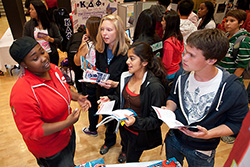Third Year: Growing as a Leader

Junior year is the perfect time for your student to emerge as a leader. During the first two years at UW–Madison, your student has learned to navigate life on campus. Now it’s time to focus on leadership skills that will help your student both during college and in a future career.
The phrase “leaders of tomorrow” is used often in college; your student may hear it during orientation, at convocation, or during commencement ceremonies. Developing leadership skills — which are valued by society in general and employers in particular — is a central purpose of higher education. By gaining early experience as a leader, your student will thrive in a competitive job market and be better prepared for the workplace.
Junior year gives students a chance to reflect upon their accomplishments so far, while also creating new goals and seeking opportunities in leadership that they can build on during senior year. While they’ve been doing a balancing act with school and socializing, they’ve learned valuable time-management skills that they can apply as leaders. And they’ve made connections that help them feel more comfortable in leadership roles.
Millenials, also known as those in Generation Y, want to be leaders and make an impact on their community and world. Being a leader can help your student not only to grow as a citizen, but also to discover how individuals and communities can bring about change.
Becoming a leader yields a multitude of positive experiences and outcomes for students, including the chance to work with people from varied backgrounds, learn more about individual values, and identify what motivates others to get involved or take action. Leadership also builds on the ability to work as part of a team; the best leaders learn how to work with others for a common goal.
Countless leadership experiences are offered on campus, starting with more than 850 student organizations. The Student Leadership Program offers workshops and activities to help students cultivate leadership skills, and students can gain experiences working in groups on research or classroom projects. Encourage your student to keep track of such experiences; when it’s time to prepare a resume, these details will demonstrate to employers what your student has already accomplished as a leader.
You can also help by reminding your student that leadership takes many forms, and that the impact he or she makes matters more than an official title. The concept of “servant leadership” — helping others rather than focusing on being in charge — is recognized as a valuable form of leadership.
Lastly, caution your student that it can be counterproductive to become involved in too many activities. Focusing on what truly interests your student can set the stage for finding a new passion or inspiring a career choice.
